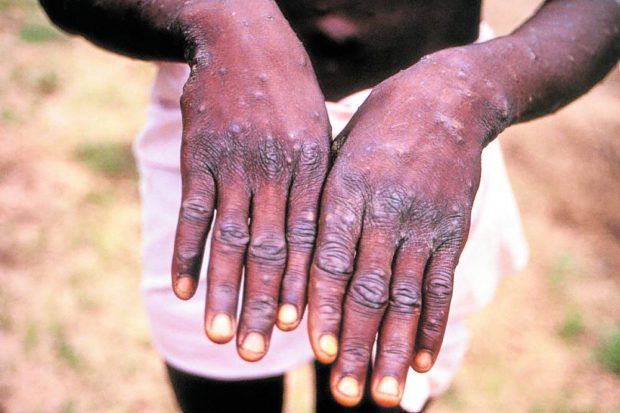Isolation, monitoring of travelers from countries with monkeypox cases pushed

FROM LATE 1990s Images taken during an investigation into an outbreak of monkeypox, which took place in the Democratic Republic of the Congo, 1996 to 1997, show the hands, arms and torso of a patient with rashes due to the disease. —REUTERS
MANILA, Philippines — Travelers from countries with recorded monkeypox cases and manifesting symptoms should be isolated to prevent a possible spread of the disease, an infectious disease expert said Monday.
“Kaya importante niyan, sa mga papasok na mga turista o mga Filipinos na nanggaling dito sa ibang bansa kung saan itong reported case, they have to be monitored also. They have to be advised in terms of kung merong naramdamang mga ganitong klaseng karamdaman and they have to be isolated at ire-report kaagad doon sa mga doktor or sa Department of Health (DOH),” said Dr. Rontgene Solante, chief of the Adult Infectious Diseases and Tropical Medicine Unit at the government-run San Lazaro Hospital in a Teleradyo interview.
(That’s why it’s a must for tourists and Filipinos entering the country from countries with reported cases to be monitored also. They have to be advised if they are manifesting symptoms and they have to be isolated and this should be immediately reported to a doctor or to the Department of Health.)
“Kasi yung rashes at saka yung mga kulani, usually it occurs on the seventh day and upward. So during the first five days, lagnat, lagnat lang yan, hindi mo talaga makitaan. You cannot differentiate it also with other viral or bacterial infection,” Solante added.
(Rashes and lymph nodes usually occur on the seventh day onwards. So during the first five days, a patient will only have a fever, symptoms will not be visible. You cannot differentiate it also with other viral or bacterial infections.)
So far, the DOH has yet to report a case of monkeypox in the Philippines.
Monkeypox outbreaks have so far been recorded in Europe and North America, along with recent reports in Australia and Canada.
The disease, which is said to be endemic in Africa, is feared to be spreading across Europe and is being transmitted by travelers.
Solante advised travelers coming from places with monkeypox cases to ensure they are not manifesting symptoms before travelling.
“Bago sila mag-travel, they have to see na wala silang naramdamang mga sintomas. Pero ganun pa man, kung halimbawa, incubating during the travel, makikita naman talaga natin yan ‘pag nakapasok yan and it’s important that they also have to be isolated,” said Solante.
(Before they travel, they have to see if they are feeling any symptoms. However, if for example, the virus is incubating during the travel, we can see the symptoms upon entry and it’s important they also have to be isolated.)
“Mataas ang hawaan nito through direct contact or respiratory droplet sa pakikipagusap, kaya napakaimportante pa rin na magsusuot pa rin tayo ng mask, maghugas ng kamay dahil isa ito sa protection para hindi tayo magkakahawaan,” he added.
(This is contagious through direct contact or respiratory droplets when talking, that’s why it’s important to still wear our face masks, to wash our hands because this will serve as a protection.)
Solante likewise pointed out that it is “difficult to differentiate” monkeypox symptoms with that of COVID-19.
He, however, said COVID-19 is more contagious than monkeypox.
“This (monkeypox) is more of an infection na kung immunocompetent ka [that if you are immunocompetent], it will not lead to complications,” Solante said.
Solante also said there is no need to close the country’s borders, stressing the importance of screening travelers upon entry.
gsg
For more news about the novel coronavirus click here.
What you need to know about Coronavirus.
For more information on COVID-19, call the DOH Hotline: (02) 86517800 local 1149/1150.
The Inquirer Foundation supports our healthcare frontliners and is still accepting cash donations to be deposited at Banco de Oro (BDO) current account #007960018860 or donate through PayMaya using this link.